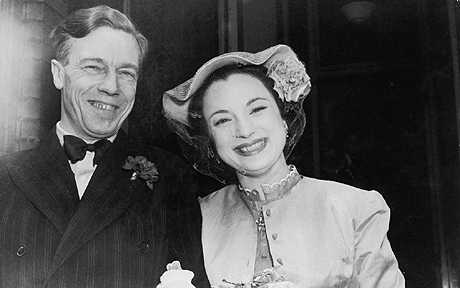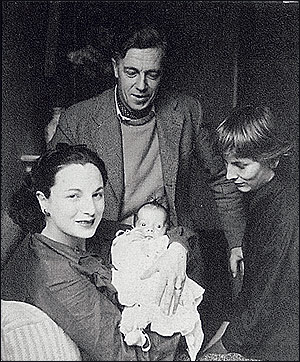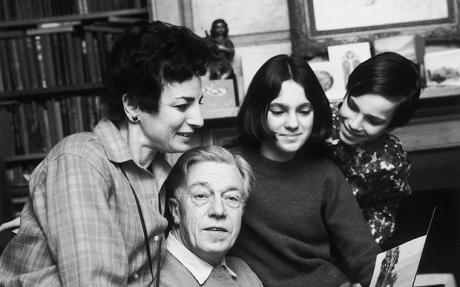<Back to Index>
- Humanist Scholar Adamantios Korais, 1748
- Poet Cecil Day Lewis, 1904
- King of Bavaria Otto, 1848
PAGE SPONSOR
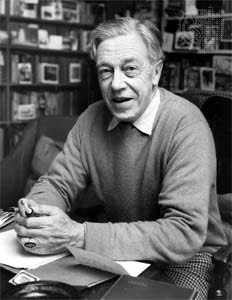
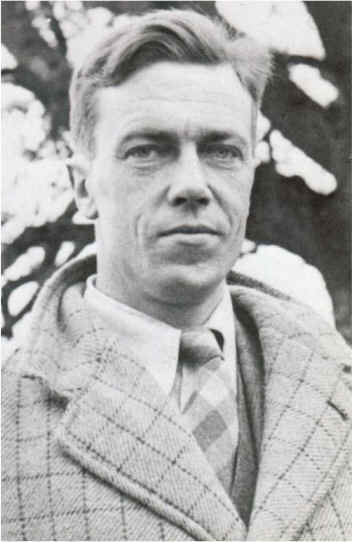
Cecil Day-Lewis (or Day Lewis) CBE (27 April 1904 – 22 May 1972) was an Irish poet and the British Poet Laureate from 1968 until his death in 1972. He also wrote mystery stories under pseudonym of Nicholas Blake. He is the father of actor Daniel Day-Lewis and documentary filmmaker and television chef Tamasin Day-Lewis.
Day-Lewis was born in Ballintubber, Queen's County (now County Laois), Ireland. He was the son of the Reverend Frank Cecil Day-Lewis (December 1872 – 19 April 1938) and Kathleen Squires. After Day-Lewis's mother died in 1906, he was brought up in London by his father, with the help of an aunt, spending summer holidays with relatives in Wexford. Day-Lewis continued to regard himself as "Anglo-Irish" for the remainder of his life, though after the declaration of the Republic of Ireland in 1948 he chose British rather than Irish citizenship, on the grounds that 1940 had taught him where his deepest roots lay. He was educated at Sherborne School and at Wadham College, Oxford, from which he graduated in 1927.
In 1928 he married Mary King, the daughter of a Sherborne master (i.e. teacher), and worked as a schoolmaster in three schools. During the 1940s he had a long and troubled love affair with the novelist Rosamund Lehmann. His second marriage was to actress Jill Balcon. During the Second World War he worked as a publications editor in the Ministry of Information, an institution satirised by George Orwell in his dystopian Nineteen Eighty-Four, but equally based on Orwell's experience of the BBC. After the war he joined the publisher Chatto & Windus as a director and senior editor. In 1946 Day-Lewis was a lecturer at Cambridge University, publishing his lectures in The Poetic Image (1947). In 1951 he married the actress Jill Balcon, daughter of Michael Balcon. He later taught poetry at Oxford, where he was Professor of Poetry from 1951 - 1956. From 1962 - 1963 Day-Lewis was the Norton Professor at Harvard University. Day-Lewis's two marriages yielded four children, including Academy Award winning actor Daniel Day-Lewis, food writer and journalist Tamasin Day-Lewis, and TV critic and writer Sean Day-Lewis, who wrote a biography of his father, C. Day Lewis: An English Literary Life (1980). Day-Lewis was chairman of the Arts Council Literature Panel, vice-president of the Royal Society of Literature, an Honorary Member of the American Academy of Arts and Letters, a Member of the Irish Academy of Letters and a professor of rhetoric at Gresham College, London. Day-Lewis died from pancreatic cancer on 22 May 1972 in the Hertfordshire home of Kingsley Amis and Elizabeth Jane Howard, where he and his wife were staying. He was a great admirer of Thomas Hardy, and he had arranged to be buried as close as possible to the author's grave in Stinsford churchyard. His epitaph reads: "Shall I be gone long? / For ever and a day / To whom there belong? / Ask the stone to say / Ask my song" In Oxford, Day-Lewis became part of the circle gathered around W.H. Auden and helped him to edit Oxford Poetry 1927. His first collection of poems, Beechen Vigil, appeared in 1925. During the Second World War his work was now no longer so influenced by Auden and he was developing a more traditional style of lyricism. Some critics believe that he reached his full stature as a poet in Word Over All (1943), when he finally distanced himself from Auden. He was appointed Poet Laureate in 1968, in succession to John Masefield. In 1935, Day-Lewis decided to supplement his income from poetry by writing a detective novel, A Question of Proof, in which he created Nigel Strangeways, an amateur investigator and gentleman detective who, as the nephew of an Assistant Commissioner at Scotland Yard,
has the same access to, and good relations with, official crime
investigation bodies as those enjoyed by other fictional sleuths such as Ellery Queen, Philo Vance and Lord Peter Wimsey. This was followed by nineteen more crime novels. (In the first Nigel Strangeways novel, the detective is modeled on W.H. Auden,
but Strangeways becomes a far less extravagant and more serious figure
in later novels.) From the mid 1930s Day-Lewis was able to earn his
living by writing. Four of the Blake novels - A Tangled Web, Penknife In My Heart, The Deadly Joker, The Private Wound - do not feature Strangeways. Minute for Murder is set against the background of Day-Lewis's World War II experiences in the Ministry of Information. Head of a Traveler features
as a principal character a well known poet, currently frustrated and
blocked from writing, whose best poetic days are long behind him; the
reader is free to speculate whether the author is describing himself,
one of his colleagues, or has entirely invented the character.
In his youth Day-Lewis adopted communist views,
becoming a member of the Communist party from 1935 to 1938, and his
early poetry was marked by didacticism and a preoccupation with social
themes. In 1937 he edited The Mind in Chains: Socialism and the Cultural Revolution.
In the introduction he supported a popular front against a "Capitalism
that has no further use for culture". He explains that the title refers
to Prometheus bound by his chains, quotes Shelly's preface to Prometheus Unbound and
says the contributors believe that "the Promethean fire of
enlightenment, which should be given for the benefit of mankind at
large, is being used at present to stoke up the furnaces of private
profit". The contributors were: Rex Warner, Edward Upward, Arthur Calder - Marshall, Barbara Nixon, Anthony Blunt, Alan Bush, Charles Madge, Alistair Brown, J.D. Bernal, T.A. Jackson and Edgell Rickword. After the late 1930s he gradually became disillusioned with communism. Among his works is his autobiography, Buried Day (1960), in which he renounces his communist views, while his detective story The Sad Variety (1964)
contains a scathing portrayal of doctrinaire communists, the repression
of the 1956 Hungarian uprising, and the ruthless tactics of Soviet
intelligence agents.
